
CATCHLINE
“If the public knew the truth, the war would end tomorrow. But they don’t know and they can’t know.”
Lloyd George, PM of Britain in 1914
PULLOUT QUOTES:
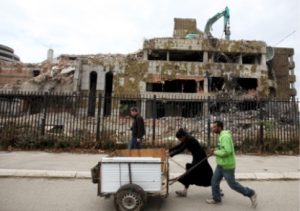
1) ‘When the Chinese embassy was bombed, the true consequences of the action were hidden. Television pictures illustrating the structural damage to the building were beamed around the world, the bodies of two passing Serbian school children were not.’
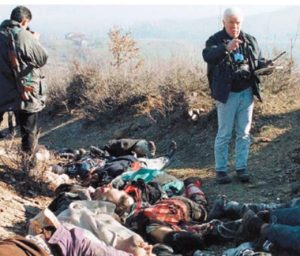
2) ‘The alleged Serb massacre at Racak, which spurred NATO’s intervention in Kosovo, was neither questioned nor investigated by the media’
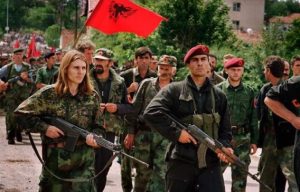
3) There was no mention [in the press] that the US Government began arming the Kosovo Liberation Army as early as August 1998; hoping, in the words of one senior defence official ‘to precipitate an ‘internal solution’ to the ongoing Kosovan ‘problem’.
HEADLINE: How NATO ‘spin’ tricked Europe into war
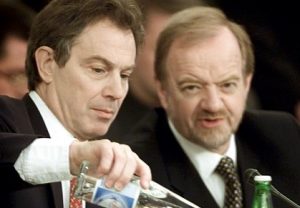
STANDFIRST: Last month, a dossier accusing Tony Blair and Robin Cook of war crimes was handed in to the the Hague.
This was the first time in modern history that a Western leader had been formally accused of violating international humanitarian law, yet it failed to make the headlines. But, as Andy Wasley reports, NATO’s entire handling of the Kosovo conflict has been characterised by news management, propaganda and censorship.
BODYCOPY:
Telephone the Foreign Office and ask how many Serbians have been killed by NATO’s bombing campaign. “We do not have access to that sort of information” says the press officer dealing with ‘Balkans issues’. “We couldn’t possibly release such facts without clearance from the most senior sources”.
Telephone the Ministry of Defence and ask how many bombs have been dropped in Serbia by NATO jets. “What a bizarre request, I don’t think anyone could answer that, except maybe our chief staff of operations,” explains the polite public relations clerk. “If you could give me a few days, I might be able to track down who might know, but I doubt that sort of request would be made public at this stage.”
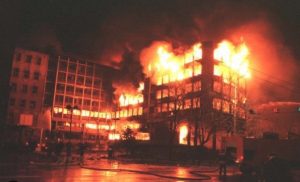
This was before the ‘official statistics’ on the real cost of NATO’s bombing campaign had been made public, but it’s still strange isn’t it? NATO bombs had been falling on Serbia for nearly three months yet no one appeared able to answer the most basic of questions. Apparently, the logistical difficulties in obtaining reliable answers to such enquiries are rife. Telephone NATO headquarters and ask how many Kosovan Albanians have been killed by the Serbian military and the reply is swift: “As far as the latest intelligence reports indicate, at least 2,000 [Kosovan civilians] are unaccounted for… considering the track record, we are treating these individuals as ‘possibly dead’.”
According to NATO, the logistical difficulties in determining the human cost of Serbia’s campaign in Kosovo are far less inhibiting than those encountered in ascertaining the scale of their own bombing campaign. This is strange, considering that NATO has records of which pilot in which plane dropped which bomb where. In contrast, the only information available on ‘victims’ of Serbian attacks comes from refugees fleeing the region.
NATO would clearly prefer to disseminate information coming from people exhausted, dazed, injured (or all three) rather than make public its own statistics. This is understandable. A lesson learnt from previous conflicts; that fighting a war without the support of a sympathetic media is political suicide, has not been forgotten. The result has been a three month ‘war of spin’ characterised by information suppression, media manipulation and news management, with London, Brussels and Washington working overtime to sustain the propaganda informing that the cause is a just one, the bombing a necessary evil.
Only last month Tony Blair, writing in a Sunday newspaper under the pretext of ‘answering those who have criticised his handling of theconflict’, spoke of Britain having a free press, of NATO and the BritishGovernment being accountable, of being open with the media. He emphasised that as a result of NATO’s respect of international law, Slobodan Milosevic had been indicted as a war criminal. What he failed to mention was that he himself may soon be indicted for war crimes, that a dossier accusing him, the Foreign Secretary Robin Cook and other leading Government officials of crimes against humanity had been handed in to the war crimes tribunal in the Hague. The little known Cambridge based Movement For the Advancement of International Criminal Law had compiled the dossier as the text of the indictment of Milosevic was being prepared in Washington and the Hague.
This was the first time in modern international history that a prominent Western leader had been formally accused of war crimes, yet it was judged to be so unimportant that it failed to make the pages of all but one national newspaper. Both television and radio ignored it entirely. It was, as one leading war critic suggested “As if it hadn’t happened.” NATO’s bombing campaign received monumental coverage in the press.
The relative accessibility of the Balkans region, its close proximity to major Western powers and access to an awesome range of technology (this was the first major conflict where the Internet has been a viable tool for journalists) led to what media monitors described as ‘more column inches and air time than any similar, comparable international event.’

Despite this impression of ‘saturation coverage’, reporting on Kosovo has been largely defined by the output of NATO’s media machine; press releases, briefings by ‘appropriate spokes people’ and graphic footage shot by NATO warplanes ten thousand feet above the ground.
As one senior Times journalist commented, “Very little of what has been [reported] originated anywhere other than ‘official’ sources.” Most reporting engaged the question of ‘how long?’ rather than ‘why?’ Nowhere in the media, early on at least, was the campaign questioned on grounds of illegality or immorality. This was despite it being widely known that Tony Blair, in encouraging his NATO counterparts to support the bombing, was effectively inciting a violation of international humanitarian law.
NATO’s bombing of Serbia without an appropriate UN resolution is comparable to Japan’s bombing of Pearl Harbour in 1941 – without precedence, a violent act of war.

Images of bedraggled refugees fleeing Kosovo were screened universally, not only to impart to the world the sheer scale of the crisis unfolding, but to justify the West’s use of force in the region. What the images failed to portray accurately was that a great many of the refugees were in fact fleeing the NATO bombs, rather than the Serbian death squads NATO accused of exclusively causing the exodus.
Television cameras filmed NATO warplanes taking off from the decks of naval craft in the Mediterranean, they ignored the accounts of refugees who had witnessed the destruction of their homes by ‘astray’ NATO bombs. For all Blair’s talk of of a free press, of being accountable, where was the balanced reporting, where was the alternative?
The coverage which did find its way onto the News At Six was enough to confirm critics fears – that its covertly ‘selective’ nature had been deliberately designed to obscure the truth. Graphic pictures portraying the victims of alleged Serbian atrocities were screened freely. In contrast, the charred remains of Serbian families blown to bits by NATO missiles were ‘edited’, deemed too offensive for public showing.

The media played along.The very language employed by NATO spokespeople was deliberately designed to shift the focus of attention away from those responsible for scenes which, in another context, would only be described as atrocities. ‘Blunder’ became one favourite, with Jamie Shea, NATO’s cockney spokesman, employing it regularly to defend the ‘occasional yet inevitable’ civilian casualties.
Rather than verbally illustrate the terrible carnage caused when astray bomb lands in a residential street, ‘blunder’ conjures up images of schoolboy comics’ generals making another mistake – ‘whoops there goes another, must do better next time’.
‘Collateral damage’ became the ideal substitute for the desolation caused when a bomb fell on a primary school rather than the munitions factory ‘confirmed as nearby’. NATO claimed from the start that it only had a bombing policy of striking targets ‘of primary importance to the Serbian government and infrastructure’. There was, according to official spokes people, ‘no policy of targeting civilians’.
Again, the use of language cleverly obscures the true nature of the campaign. NATO may not have set out to machine gun civilians on the
street, but if they happened to be inside or in the vicinity of ‘legitimate’ targets, then so be it.

When the headquarters of Serbia’s leading television station was hit, twelve (later revised to seventeen) workers lost their lives (producers, technicians and the tea lady were among those killed), NATO claimed this to be ‘a regrettable consequence.’ Knowing that TV stations maintain twenty four hour staff presence, can such a policy of no targeting of civilians still be believed?
Equally, when the Chinese embassy was mistakenly hit, resulting in several deaths, the true consequences of the action were hidden. Television pictures illustrating the structural damage to the building were beamed around the world, the bodies of two passing Serbian school children were not. The media played along.

Closer to home, BBC executives in London, when faced with the prospect of an anti war debate being held in their building (ironically, in the National Union of Journalists room), did everything in their power to cancel the meeting, informing the principle speaker, Alan Simpson MP, that the event was ‘off’, and forcing it to be rescheduled to a nearby university campus.
More covertly, when an election broadcast for the Socialist Labour party was found to contain graphic images of victims of a ‘blundered’ NATO bombing mission, BBC executives took the decision to cut the offending images; referring the issue to the Independent Television Commission, which immediately upheld the decision. According to a spokesman, “Such images, if allowed to be used in the context of politics, and at a time such as this, could be seen as unacceptably undermining the integrity of the ruling [Labour] administration.”
Clearly, the broadcasting of scenes which visually illustrate the human cost of NATO’s bombing campaign is seen as unpalatable and outside the ‘margins of decency’ that the BBC and ITC so vigorously uphold. Questioning the integrity of the Labour party (it was the Labour party, was it not, which ordered British jets into action over Serbia?) clearly steps beyond the boundaries of ‘fair play’ and ‘unbiased’ reporting that the BBC built its reputation upon.

The few journalists who did question the bombing campaign quickly found themselves isolated, ridiculed or intimidated. When the BBC’s John Simpson suggested early in the campaign that NATO’s bombs were having little effect on the Serbian public’s support for Milosevic, Government officials accused him of a ‘wholeheartedly biased stance which was both damaging to the campaign and to impartial broadcasting.
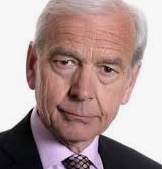
When Today presenter John Humphrys said on air that the bombing of Serbia was ‘a mess’, his comments were compared to asking ‘What happens if it doesn’t work?” at the time of the D-Day landings. Rather than support Humphry’s approach, BBC chiefs responded by axing a travel documentary examining Serbia, as one senior producer put it “Openly signalling which side of the fence the BBC would be sitting on.”

John Pilger, commenting in the Guardian, spoke out against what he saw as the Western media’s self censorship and found himself at the centre of a number of allegations, ranging from being ‘ever madder’, ‘a liar’ and a ‘plain propagandist’. His claim that up to thirty eight NATO warplanes had been shot down (official NATO sources put the figure at two), was roundly criticised for being incorrect.
Anyone seriously researching the issue of how many warplanes have been lost will know that the true figure is nearer twenty than the mere two widely reported. A telephone call to NATO HQ will confirm that ‘Two US planes have been shot down, [we] cannot confirm or deny that a number of others have been lost.’
Apparently, journalists need to contact NATO countries individually to clarify ‘further enquiries’. Do this, and the aircraft toll rises significantly.
NATO defended its public statistic by pointing out that its spokespeople answer specifically what they are asked – in most instances, how many aircraft have been ‘shot down’. The figure does not include craft ‘damaged’, ‘missing’ or ‘otherwise unaccounted for’.
The example illustrates both the selective nature of NATO’s media machine and the press’s disturbing reliance upon it. No one, it seems, bothered to check beyond the briefings stating that only two aircraft had been lost.
Similarly, when journalists approached national papers in May with a story suggesting that Greek hoteliers were planning to sue NATO for a loss of tourist earnings, it was turned down on the basis of being ‘without substance’ as the number of Western travellers visiting Greece had in fact increased. This was true, but only in so far as the figure had increased on the previous month’s paltry statistics – overall, tourist visits to Greece and the Eastern Mediterranean were at an all time low, partly because of the region’s proximity to the Balkans war zone.
Editors had telephoned the Greek national tourist office and NATO (both falsely claimed that the story had been fabricated by Serb sympathisers in an attempt to cause a rift between an already strained Athens and Brussels) but failed to contact hoteliers themselves. Neither had they attempted to question in what context the tourist statistics had increased.
By the time the journalists concerned had pointed this out, the original issue of the hoteliers suing NATO (an unprecedented action) had been overshadowed by an argument over the interpretation of statistics. As one reporter put it , “NATO spin effectively killed the story – the national press, knowingly or otherwise, assisted in the process.”
NATO’s media machine had worked overtime earlier on during the conflict to ‘kill’ similar stories which had attempted to highlight a range of alternative motivations for the bombing campaign.
When journalists suggested that British and US economic foreign policy objectives, rather than any genuine ‘humanitarian agenda’, might account for the attacking of Serbia, NATO spokespeople denounced such suggestions as “Mere muck raking”. One senior Foreign Office representative commented that “Such theories belong in the history books. They might explain [wars] in the nineteenth century, but not in the present day” – as if international diplomacy didn’t exist in the contemporary world!
Such a response came despite William Cohen, US Secretary of Defence,clearly illustrating NATO’s economic position on the Balkans last year:
“Expanding into Eastern Europe spreads political stability, and with that spread of stability there is a prospect to attract investment.”

Michel Chossudovsky, Professor of Economics at the University ofOttawa, captured the mood of many leading foreign policy commentators when he explained the contemporary Balkans problem in terms of expansionist commercial and economic objectives: “International financial institutions and creditors [are attempting] to subject the [Balkans] economies to massive privatisation and the dismantling of the public sector. While attention is focused on troop movements and cease fires, the Balkans is busy being transformed into a safe haven for free enterprise.”
Such a move would generate potentially limitless revenue for Western business and Governments, the interest charged on loans from the World Bank and International Monetary Fund (IMF) enough to eventually outweigh any costs incurred in waging a bombing campaign against Serbia.
When Chossudovsky argued, with evidence, that the “cultural, ethnic and religious divisions are highlighted, presented dogmatically as the sole cause of the crisis when in reality they are the consequence of a much deeper process of economic and political fracturing”, he perhaps captured the beliefs of all those opposed to the bombing.
In fact, both the US and Britain have long regarded the Balkans as a staple region in which to expand the principles of free market economics; since the Dayton Accords ended the last conflict in the region the number of European multinational companies operating there has trebled.
Serbia and Kosovo strategically holds some of the world’s richest resources in terms of mineral extraction – last year Greece signed a multi billion dollar deal with Serbia to expand a joint mining operation which could generate over a trillion dollars in export revenue, in part explaining the Greek Government’s reluctance to bomb Serbia.

The Anglo-American wing of mining conglomerate, RTZ, also operates mines in both Macedonia and Bulgaria, its operations in the Balkans theatre under threat as long as the ethnic conflicts continue. A leaked memo from a senior RTZ official clearly illustrates the company’s position: ‘If the [NATO] mission in the Balkans fails to smooth the unrest out, and the current violence continues, [RTZ] will seriously have to reassess its involvement in the region. The Foreign Office cannot seem to reassure us for the future.’
Despite such evidence, NATO refused to acknowledge that economic objectives played any part in its motivation, stating that any story which suggested so was ‘without foundation’.
Few newspapers, television or radio stations entertained the idea (those that did mentioned the region’s economic potential, but failed tohighlight the political implications), one commissioning editor stating thatthe isolation that would result [from running such a story] outweighed the benefits.
‘Without foundation’ was also applied by NATO to suggestions that alleged Serbian massacres were being ‘overplayed’ and manipulated in the media in an attempt to justify the bombing, deflect attention away from mounting NATO ‘blunders’ and alleged atrocities carried out by the Kosovo Liberation Army.

When John Sweeney in the Observer exposed how Serbian police had brutally massacred a large number of Kosovan Albanians in the village of Little Krushe in late March, the piece was received, justifiably, as ‘seminal proof’ that Serbian atrocities had indeed taken place. There was however, no coverage of emerging evidence suggesting that previous alleged Serb killings were being ‘set up’ by KLA fighters, eager to use such tactics as propaganda to speed up NATO’s intervention in the conflict.
Less than a week after the Observer’s chilling report; journalist Reid Irving highlighted how KLA fighters may have ‘hoaxed’ the widely reported ‘January 16th’ massacre at the village of Racak. According to Irving, after a gun battle between KLA fighters and Serbian police had finished, 22 bodies were discovered in a shallow grave on the outskirts of the village. Foreign journalists were invited to the site by members of the KLA and told that whilst the battle had raged, civilians had been rounded up and shot by Serbian police.
The journalists, suspicious of the amount of time the Serbs would have had to carry out such an act, claimed they were unable to get reliable testimony to the exact chronology of events from the KLA. Joined by pathologists from Belarus and Finland, they also reported that the bodies had had clothing changed, that injuries didn’t match damage to clothing and that additional bullets had been fired at close range to give the impression of a massacre.
Although, as Irving points out, the jury may still be out as to whether the Racak massacre was a KLA hoax, the element of doubt is significant as it was this event which spurred the US and UK to step up movements towards using force to ‘stabilise’ the situation.
The Racak massacre also first prompted the significant use of the term ‘genocide’ in the media to describe events in the former Yugoslavia, which, as historian Thomas Craig pointed out, “[alleged genocide] was the primary means by which NATO leaders attempted to persuade the public that their involvement was now necessary.”
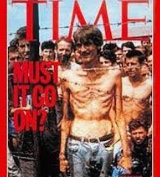
No attempt to question this was made by the media.This same selective reporting was also applied in Britain to an article in LM magazine which investigated the circumstances surrounding the now famous ITN pictures of a starved Bosnian Muslim, Fikret Alic, apparently caged behind barbed wire at the Bosnian Serb run ‘Trnopolje’ camp in 1992. These images became the most powerful symbol of the Bosnian war and according to NATO, provided evidence of Serb run ‘concentration camps’ – evidence which spurred the US, UK and other Western nations to begin moving into the Balkans in a serious manner.
The article, written by Thomas Deichmann, suggested that the camp was no ‘Nazi-style concentration camp’, that it in fact the ITN camera crew had filmed the ‘prisoners’ through barbed wire belonging to an adjacent agricultural compound, rather than wire encircling the camp, providing a misleading picture of the situation to the world.
Despite being published across Europe, when LM magazine ran the piece in Britain, ITN demanded that all copies be pulped, that the editors apologise and that damages be paid. When LM refused, in the words of a senior editor ‘to be gagged in an unprecedented move to silence the independent media’, ITN issued writs for libel, the case still awaiting trial.
Although the issue itself has received some coverage, its wider implications for freedom of speech and in explaining the continuing Balkans unrest have not. Few newspapers, television or radio stations have seriously examined the background to an event, which, as with the Racak massacre, sparked off NATO’s use of force in the Balkans. Instead, both Deichmann and the editors of LM have systematically been branded as’Serb apologists’ and compared to the revisionist historians associated with the Holocaust.
There’s been no outcry at an attempt by a major news provider to stifle an alternative view of world affairs by an important independent magazine. The dominant perspective, and NATO’s associated actions, have been endorsed without significant protest or investigation.
Even now as the first phase of the conflict draws to a close, and NATO troops move into occupy Kosovo, the news management, spin and censorship continues.
When the KLA first suggested that it would not lay down arms in the face of a NATO ‘peacekeeping force’, the media widely reported both Clinton and Blair firmly stating that such a stance contradicted the agreement reached in the Rambouillet accords. What it failed to report was that a great many of the weapons in the hands of the KLA were supplied by US arms exporters.
There was no mention that the US Government began arming the Kosovo guerrillas as early as August last year; hoping, in the words of one senior defence official ‘to precipitate an ‘internal solution’ to the ongoing Kosovan ‘problem’.
As the first retreating Serbians were shot by British, American and German troops entering Kosovo, and the first sites of alleged war crimes ‘discovered’, there was no mention that US planes were providing ‘tactical support’ to KLA fighters engaging rogue units of the Serbian police.
This ‘tactical support’ was the usage of cluster bombs against a military with little significant fire power; mostly civilians armed with ageing Russian made rifles.
Such a move clearly contradicted the rhetoric of Blair when he stated that ‘NATO will avoid taking sides, we are acting purely in the name of humanitarianism’.
Commentators are already talking of the Kosovo conflict as being ‘well managed’ by NATO, Blair specifically. In the words of one leading columnist “He [Tony Blair] has shown the world that he means business; that he is prepared to use force in the name of good overriding evil, in the name of morality. When entering a war, one must decide if the good that will be done overrides the evil it is challenging. In this case, that is what his actions have done – illustrated the good over the bad.”
This ‘just and moral’ war has led to the killing of well over ten thousand Serbian people, many of them civilians. It has smashed the Serbian economy and infrastructure and destroyed the natural environment. It has displaced over a million people and destabilised the entire region, creating a situation where NATO troops have had to be deployed. The media describes this and NATO’s illegal invasion as the ‘Liberation’ of Kosovo.
This ‘well handled’ war also extends to the intimidation, degradation and isolation of an entire country – Blair’s announcement that Serbia is to receive no aid as long as Milsovic retains power is comparable only to the sanctions placed on Iraq following the Gulf crisis. In Iraq ‘no aid’has resulted in widespread poverty, disease and unrest; when Britain and the US trade aid in return for oil, they are trading in people’s lives.
Equally, when the British Government admits to sponsoring a ‘Kosovo Regeneration Taskforce’ to ensure that British companies win multi billion dollar contracts to rebuild the region it has in part destroyed, there is silence from the media.
Amongst the thousands of words printed and broadcast on the crisis where is the most fundamental of questions: why Kosovo? There are 37 wars taking place around the globe, Britain and the US are not interfering in these, often bloodier conflicts. The media has failed to even ask, let alone answer, such a question.
The Balkans has been a centrepoint for Western Imperialism for over two centuries, the same powers that ‘intervened’ then, ‘intervene’ now. When the Sultan Abdul-Hamid II of Turkey described in 1876 how ‘The expansionist tendencies of the [European] powers probably has more to do with bloodshed [in the Balkans] than any of the ethnic groups, however insurgent’, he little realised the profoundness of his words. Any journalist daring to suggest a much wider background to Kosovo than the soundbite pumped out by NATO is quickly dismissed as ‘radical’, ‘marginal’ or worse. Journalism offering the alternative is stifled so that the truth remains distorted and unclear.
History has illustrated this. When Britain, the US and the other nations of ‘justness’ have acted in the name of ‘humanity’ and ‘creating stability’, their motives have proved questionable at best, murderous at worst. Vietnam, Cambodia, the Falkands and the Gulf bear testimony to this. Even now, whilst engaging in Kosovo, the US and Britain are bombing Iraq almost daily, and America is attempting to up the stakes in the FarEast by deploying a mini ‘Star Wars’,‘Theatre Missile Defence’ (TMD), between Taiwan, Japan and South Korea, part of Clinton’s plan to isolateChina militarily. This will destabilise the ‘East’ as in the ‘West’, all in the name of ‘ethical’ US foreign policy objectives.
Clinton talks of ‘decent, moral values’, Blair of ‘the right thing to do’. The US financially supports the Turkish Government, one of the worst violators of human rights in the world. A government which has systematically slaughtered one and a half million Armenians through ‘ethnic cleansing’ (the primary motive for Clinton’s war against Serbs), which tortures, murders and imprisons ‘dissidents’ and which uses tanks to prevent people from attending polling stations in time of elections. Clinton calls this a democracy.
The UK has repeatedly sold arms to Indonesia, a regime which has murdered over 200 000 East Timorese in the name of ‘occupation, a regime which breaks up demonstrations with bullets and grenades. Of the forthcoming referendum on independence for East Timor, Blair speaks of ‘excellent progress’, ‘of Britain’s ‘commitment to democracy.’
Democracy is what he spoke of when the first bombs fell on Belgrade.
******
[Andy Wasley is a journalist and researcher specialising in media issues. He is editor of The Brighton and Hove People/Channel Media
news service and has written widely on censorship issues for, amongst others, The Independent, Journalist, Index on Censorship, Boston Globe and Red Pepper.
Additional research by Kevin Dowling, Keith Rhyle, Molly Brandl Bowen (Jewish Guild of Journalists, BBC and ITV research, winner of Margaret Rhonda Award for outstanding services to journalism, member of Inter-Strategic Intelligence Forum), Steve Stylianoudis (Director, Washington DC and Athens, Inter-Strategic Intelligence Forum), and Ian Craig (BBC, Guardian, Brighton and Hove People, Channel Media)]